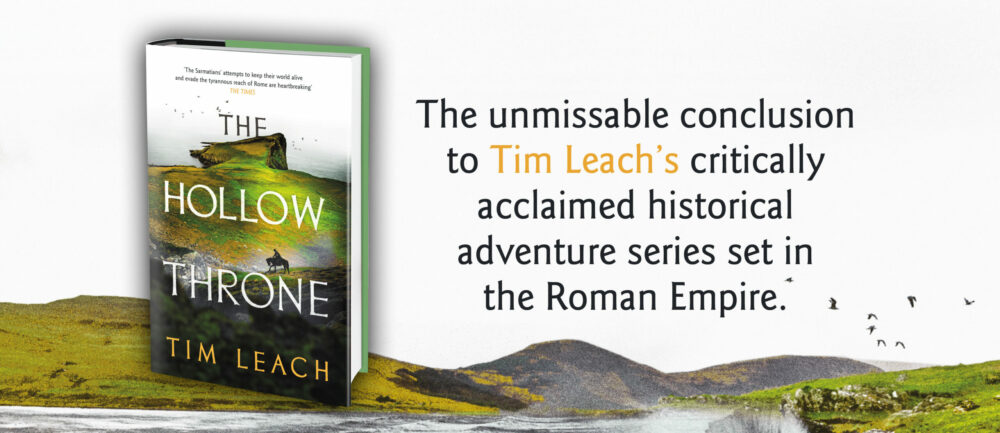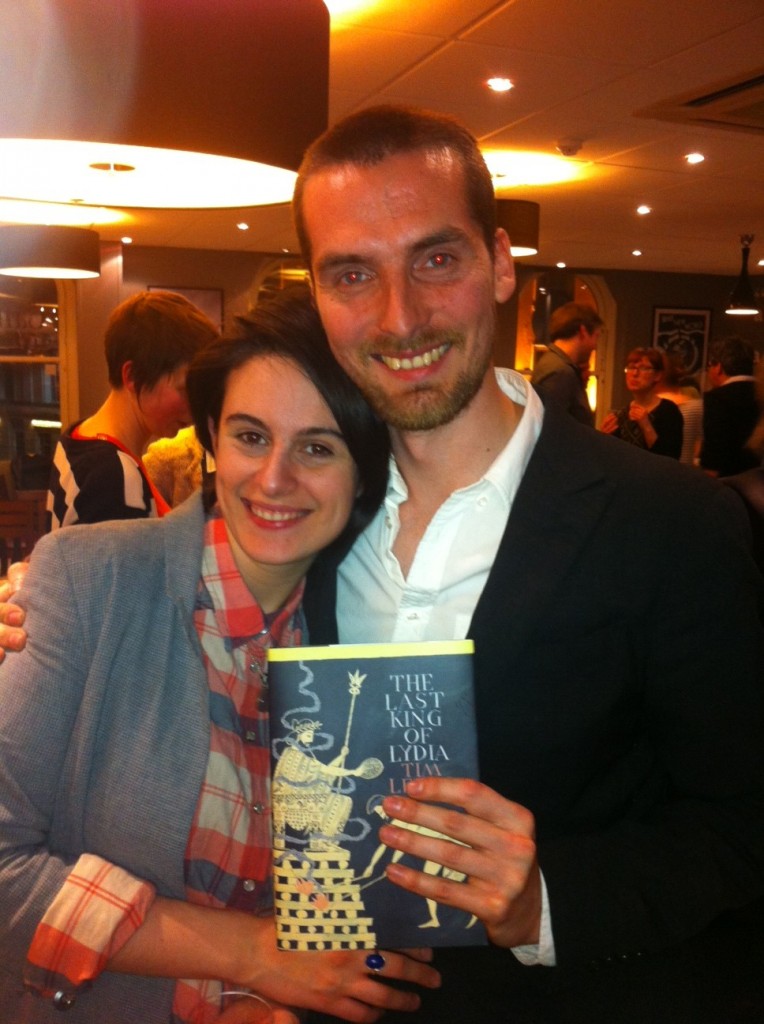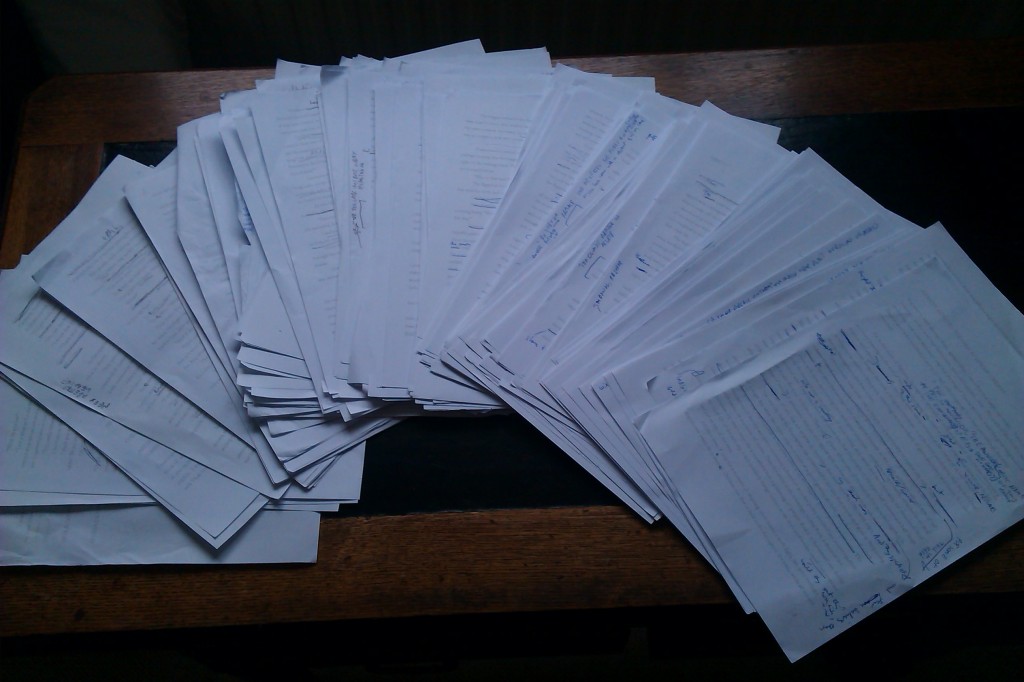I’m absolutely thrilled to report that The Last King of Lydia has been longlisted for the 2013 Dylan Thomas prize.
Author Archives: TimLeach
Last King of Lydia on offer this month!
A writer’s tips on using writing tips
Write 500 words a day, no more, not less. Or 2000. Or don’t bother with word counts, that’s all bollocks, write for two hours a day. Or four. Plan every chapter meticulously, but don’t plan anything at all because it’s got to be spontaneous. You must write in the morning, it’s the most creative time of the day, studies have proved it. Except for the evening, the magic only happens after midnight, everyone knows that.
Why can’t we just write? Why do we have all of this advice out here, why bother to construct complex methodologies and individual rituals?
That all this advice is contradictory does not mean it is not of use. More critically, it does not mean that some are right and some are wrong. They all serve to provide possible solutions to the problems of writing. We can spend so much time picking through writerly advice, sharing top ten lists, debating one set of techniques over another, that we can lose sight of the problems they are trying to solve. And if you haven’t properly considered the problem, you can’t find the solution to fit it.
It’s important to return to first principles every once in a while; to remember just what it is that makes writing so difficult. Some of the bigger ones just in the drafting stage include:
- Fear of the blank page at the start of the day
- Exhaustion, disillusionment, and losing momentum part way through a project
- Idea not fully realised, and insufficiently complex to sustain a novel
- Characters and world insufficiently developed
- Lapsing into cliche
You shouldn’t be writing in a particular way because Hemingway tells you to. Writing methods are not rituals to be followed in the hope that the Gods will be favourable to you. They are practical solutions to difficult problems, not secret techniques that will magically make you a great writer.
It’s useful to see how others have approached these problems, but if you obsess too much over deciding on one approach over another, you are like a man hesitating between a bucket of water and a bucket of sand when his kitchen is on fire. Both will work, one might even be marginally better than the other depending on circumstance, but the important thing is to get on with it before the whole house burns down.
Identify problems, improvise solutions, and accept there is no “right” answer to writing. There is only what works.
Amateur vs Professional, or, The Pursuit of Fun vs the Pursuit of Excellence
There are two main activities in my life – writing and rock climbing. In one, I have achieved a professional standard. In the other, I am merely an enthusiastic amateur.
There are a number of reasons for this. I’ve been writing longer than I have been climbing (10 years vs 3 years), and I think I have a better natural aptitude for writing books than climbing rocks. But much of it is down to approach, my methods. I would be a much, much worse writer if my approach were less professional. If I approached climbing the way I approached writing, I would be a much stronger climber.
Indeed, my approach to climbing is a good guide on what not to do when it comes to writing, or any other activity that is a recreation to most and a profession to the few. Here are a few amateur habits to avoid if (and it’s a big if) you want to turn professional…
Being Ruled by Mood
I have a routine of climbing, 3 or 4 times a week, that I stick to quite well. But when I don’t feel like climbing, I don’t. When I don’t want to push myself, I don’t.
Of course, a lot of the time I don’t feel like writing. I do it anyway, every day, because that’s what professionals do. Sometimes it’s a miserable business, and I write terribly. And yet still, I write. Any day spent writing, no matter how badly, is going to be better for your development than a day you don’t write. Equally with a sport, it’s pushing beyond that threshold of boredom, exhaustion and suffering that gets you to peak performance.
Refusing to Train Your Weaknesses
Even when I do climb hard and push myself, there’s plenty of stuff I still won’t make myself do. I don’t like roof problems, powerful moves off slopers, or scary runouts. I like fingery technical face climbing, bridging corners, and jamming cracks. When I go out to climb, invariably I’ll pick something that suits my style, and avoid the kind of climbs that show up my weaknesses. After all, I might look foolish, struggle on something easy, and that wouldn’t be very much fun.
In writing too, we all have our comfort zones, usually a genre or a setting that we can relax into like an old comfortable sofa. We all have the areas of writing we dislike – for some it is dialogue, others action. Some struggle with structure, others with style. But we must work ferociously hard to improve in the areas we are naturally weak, or we become lopsided in our development, hobbled by our flaws. And it is only when the work challenges us most that it truly begins to mean something.
Being Distracted by the Social Side
I can go to the gym or out to the crag and barely climb at all. This weekend, for example, I climbed precisely one route of moderate difficulty. One route in two days of glorious weather! But that doesn’t matter, I had a grand old time out in the hills with my friends. When I go to the climbing gym, it’s as much to lounge around and drink coffee with some fine folks as it is to pull hard and get strong.
Initially, this would seem difficult to do with writing, solitary activity that it is, but actually it’s very easy. Talking about writing online, going to readings and events, hanging out with arty people, running book clubs and critique groups – these are all ways to feel creative and have a good time without, y’know, actually doing anything particularly productive. The professional sacrifices much of this social fun stuff, whether that’s sitting around the pub talking about climbing or going to a poetry recital. They do this from time to time, but they never let it get in the way of work or training. They make sacrifices, big ones sometimes, and they are rewarded for it.
* * *
Will I change my approach, knowing so clearly what it is I have to do to become a better climber? Of course not, because here’s the crucial thing: the main focus of the amateur is the pursuit of fun. The main focus of the professional is the pursuit of excellence.
The two aren’t mutually exclusive. People who do stuff for fun still want to get good. Excellence can be fun. It’s also a hell of a lot of hard work that is rewarding and fulfilling, but often not pleasurable in a relaxing, recreational way. I’ll never be the best I can be at climbing, because having fun is more important. I’ll never have as much fun as I could writing, because I want it to satisfy some deeper part of me.
Which path should you choose? That’s up to you, and it depends entirely on what you think writing can do for you. Remember this maxim: The amateur has a lot more fun than the professional. The professional achieves a deeper fulfilment than the amateur.
What place you choose for writing (or for climbing) depends on who you are and what you need. Do you want writing to be really fun, or do you want it to fulfil you profoundly? Both are worthy goals, but never forget that you’re going to have to choose one over the other.
Don’t be good, be interesting
Beginning writers are invariably tormented by one question above all others: is it any good? And it is a question born of a singular fear, the fear that people will hate your stuff, and perhaps, as a follow on, that they’ll hate you too.
I bring you good news: very few people will hate your work, no matter how poorly it is written. Nor will they hate you. I also bring you bad news; they may not hate it, but if your work does not capture their interest quite quickly, they will probably be indifferent, get bored, and chuck it aside. To put this in another way: you are afraid of the wrong thing.
This misguided fear often comes as a side effect of attending writers groups and taking a course in creative writing. For the most part these are excellent for aspiring writers, developing skills, giving feedback and teaching you how to respond to critique. The one downside is that you get used to having your work read in its entirety. You begin to take it for granted.
In a workshop, even if someone hates what you’ve done, they’ll read it all, maybe even twice, and give you a detailed list of reasons why they hate it. When you get out into the real world, an agent, editor or casual reader will put it aside after a single poor page. Indeed, that page need not even be poor. An opening that is a little slow, that is slightly boring – for such minor sins, an entire piece of work will be cast aside, unread.
There is a lesson to be learned here, and it is a liberating lesson. Rather than telling yourself, when you sit down to write, “I need to be good, or they will hate me”, instead you should ask yourself “the reader might get bored, I had better keep this interesting.”
Not only is this less intimidating (I think most of us would rather be thought of as being slightly boring than as being hateful) it also leads to better writing. Sometimes, when we deliberately try to be good, it leads to work that is defensively pretentious, overwritten, artificially elegant, and ultimately hollow. When we instead try to produce work that is interesting, it tends to be tight, precise, engaging, and surprising.
In other words, it tends be good.
First Print Review – Literary Review
Sheffield Telegraph Interview
My interview in the Sheffield Telegraph is up! Click here to read about mythological soap operas, and my shady past of getting naked for money…
Early Review Roundup
A few early reviews on the blogs have come up…
5 stars and a book of the year nomination at For Winter Nights
“Hugely poignant and at times shocking but always beautifully, lyrically written…I cannot praise The Last King of Lydia enough, nor urge you enough to read it…Without doubt, this is a contender for my novel of the year.”
A lovely write up at We Love This Book
“This is Tim Leach’s first book, which is a shame, because The Last King of Lydia is so good you will want to read more of his work…since Mary Renault there have been few voices that have brought the Hellenic tales to life so well, and last year The Song of Achilles swept in as a welcome return to that voice. This year, The Last King of Lydia will continue the song.”
Another 5 stars from Bookbag.co.uk
“On the surface, the book is an enjoyable adventure set in an ancient world, but the message of the book goes much deeper. Reading the story encourages a great deal of self-reflection and analysis…this is an absorbing, refreshing novel which offers something a little different to the norm.”
An enthusiastic write up from the Falcata Times
“A novel that is thought provoking, gives the reader a story of epic proportions and wraps it up with neat prose, solid dialogue and wonderfully imagined storytelling.”
4 out of 5 from The Rocker 65 (hey, that even rhymes)
“A fascinating and rip roaring read…well written with characters that spring to life.”
You can also see the ongoing battle between the 4 and 5 star reviews on Amazon here, and the Goodreads page here.
Many thanks to everyone who has read and reviewed it so far, it’s really thrilling to me that it has had such a positive early response.
The Book is Launched!
The book is out! We launched The Last King of Lydia at Waterstones Greenwich on March 28th. It was a magic night, and thank you so much to everyone that came. There’s a video of me jabbering away and doing a reading, and I’ll stick photos up on this post as I get them.
The book is available on Amazon, Waterstones, and by order in any bookstore (ISBN 9780857899170). Many thanks again.



